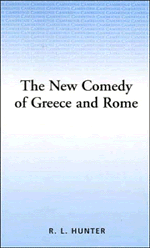4 - Themes and conflicts
Published online by Cambridge University Press: 01 June 2011
Summary
Men and women
The relationship between the sexes is central to the plot of many plays of the New Comedy, which thus forms a significant body of evidence for the position of women in antiquity. Nevertheless, this evidence cannot simply be accepted at face value; a number of factors suggest that the picture which comedy presents is a very partial one, and it is worth setting out the most important of these.
The first fact of obvious significance is that all ancient comic poets were male and the audiences for whom they wrote, in both Athens and Rome, were predominantly (in Athens perhaps exclusively) male. Comedy may thus be more valuable as a source for public (male) attitudes to women than for privately held sentiments, and the women of comedy can only speak for their sex to the extent that a male dramatist is able to create a convincing character. It is, however, with a male audience that this character must carry conviction, and so we might expect that the verses which male poets give female characters will be phrased so as to accord with male assumptions and avoid giving offence to male prejudices. Two examples will, I hope, give sufficient illustration of this. The first one comes from a play of which neither title nor author is known.
- Type
- Chapter
- Information
- The New Comedy of Greece and Rome , pp. 83 - 113Publisher: Cambridge University PressPrint publication year: 1985



